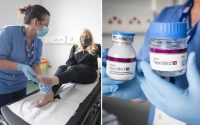Plastic particles pass from pregnant mother to fetus: rat study
Rats!
Microscopic plastic particles found in most food and drinking water can pass from pregnant rats to their unborn babies, a new study suggests, and the outlook is grim for pregnant women.
Also known as MNPs, the nano-sized microplastics have polluted our oceans and bodies — now, researchers say they can harm the fetal development of rats. The Rutgers University study, published last month in the Nanomaterials journal, was presented this week at the American Association for the Advancement of Science Conference in D.C.
“Much remains unknown, but this is certainly cause for concern and follow-up study,” Philip Demokritou, a Rutgers professor in nanoscience and environmental bioengineering, said in a statement.

As part of the research, specially marked nanoscale plastics were provided to five pregnant rats. Subsequent imaging found these nanoplastic particles permeated not only the rats’ placentas, but also the livers, kidneys, hearts, lungs and brains of their offspring.
The scientists noted that previous studies in pregnant laboratory animals found adding these plastics to food impairs their offspring in various ways, but that research hadn’t determined whether mothers passed the plastics to their fetuses.
Demokritou said future studies will investigate how different types of plastics cross cell barriers, how plastic particle size affects the process, and how plastics hinder fetal development.
“I don’t want to scare people, but this is an emerging contaminant, and we have a lot of unknowns in terms of the risks,” Demokritou told the Daily Mail.
“We cannot go back to the Stone Age, but as a society we need to become smarter, embrace sustainable concepts, to avoid crises like this,” he added. “All of us, scientists, the public, society at large, regulators, we need to rethink how we produce and use materials and chemicals in general.”

It’s been shown that chemicals, toxins and even microplastics are commonly ingested via the foods we eat, tools we cook with and items we use daily. Demokritou says humans ingest a credit card’s worth of plastic every week.
“Petroleum-based plastics are not biodegradable, but weathering and photooxidation break them tiny fragments. These tiny fragments, called micro-nano-plastics, are found in human lungs, placentas and blood, raising human health concerns,” Demokritou said in his statement.
“As public health researchers, we are trying to assess the health risks from such an emerging contaminant to inform policymakers and develop mitigation strategies.”
In 2020, scientists detected microplastics in expectant mothers’ placentas, which experts claimed could create a so-called “cyborg baby.” Other reports have suggested that plastic water bottles could be exposing humans to an excessive amount of those contaminating nanoparticles.
Research has also shown that baby poop can contain microplastics at a rate of 10 times more than adults.
“Unfortunately, with the modern lifestyle, babies are exposed to so many different things for which we don’t know what kind of effect they can have later in their life,” study co-author Kurunthachalam Kannan, a scientist at NYU’s Grossman School of Medicine, previously told Wired.
“I strongly believe that these chemicals do affect early life stages … That’s a vulnerable period.”


